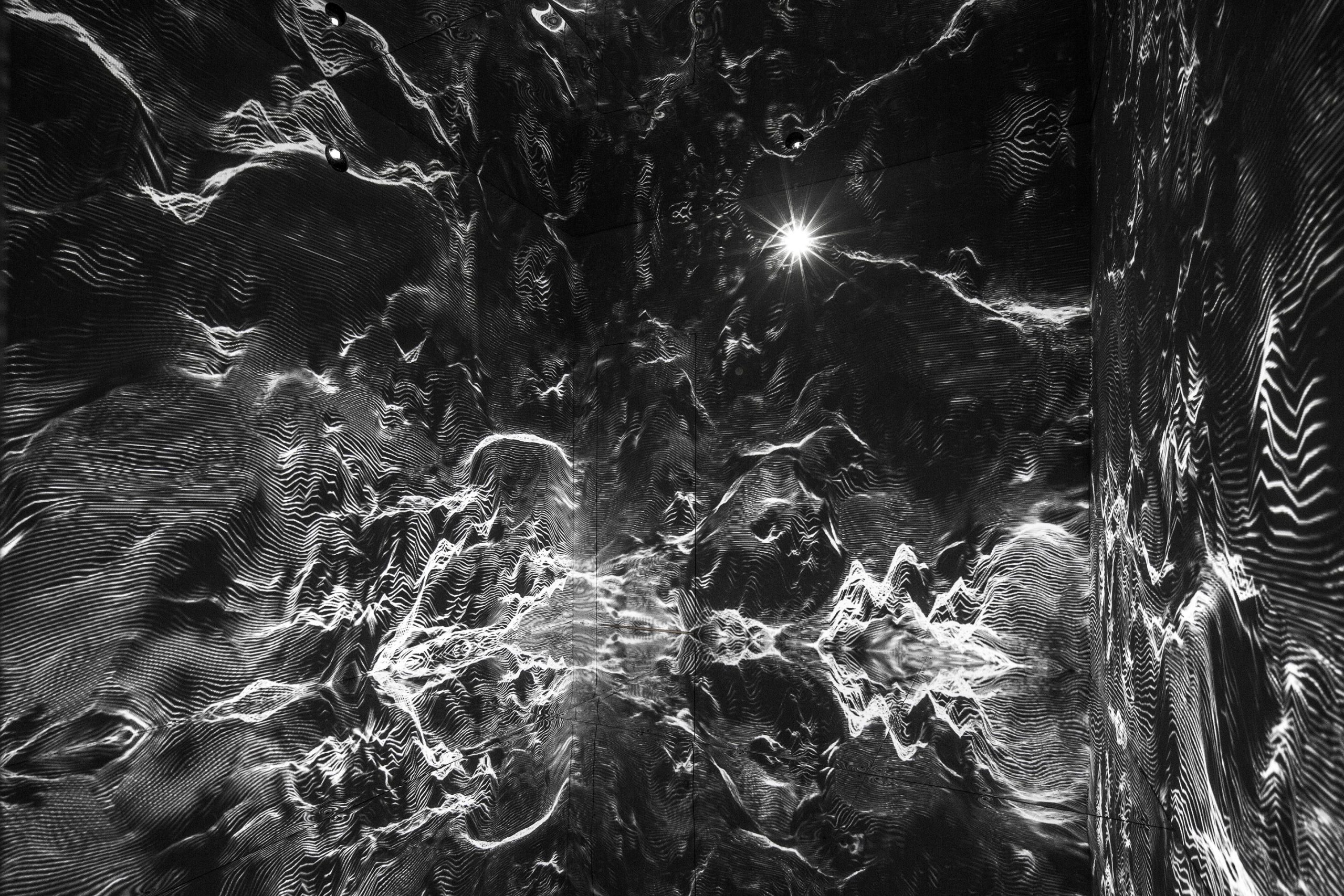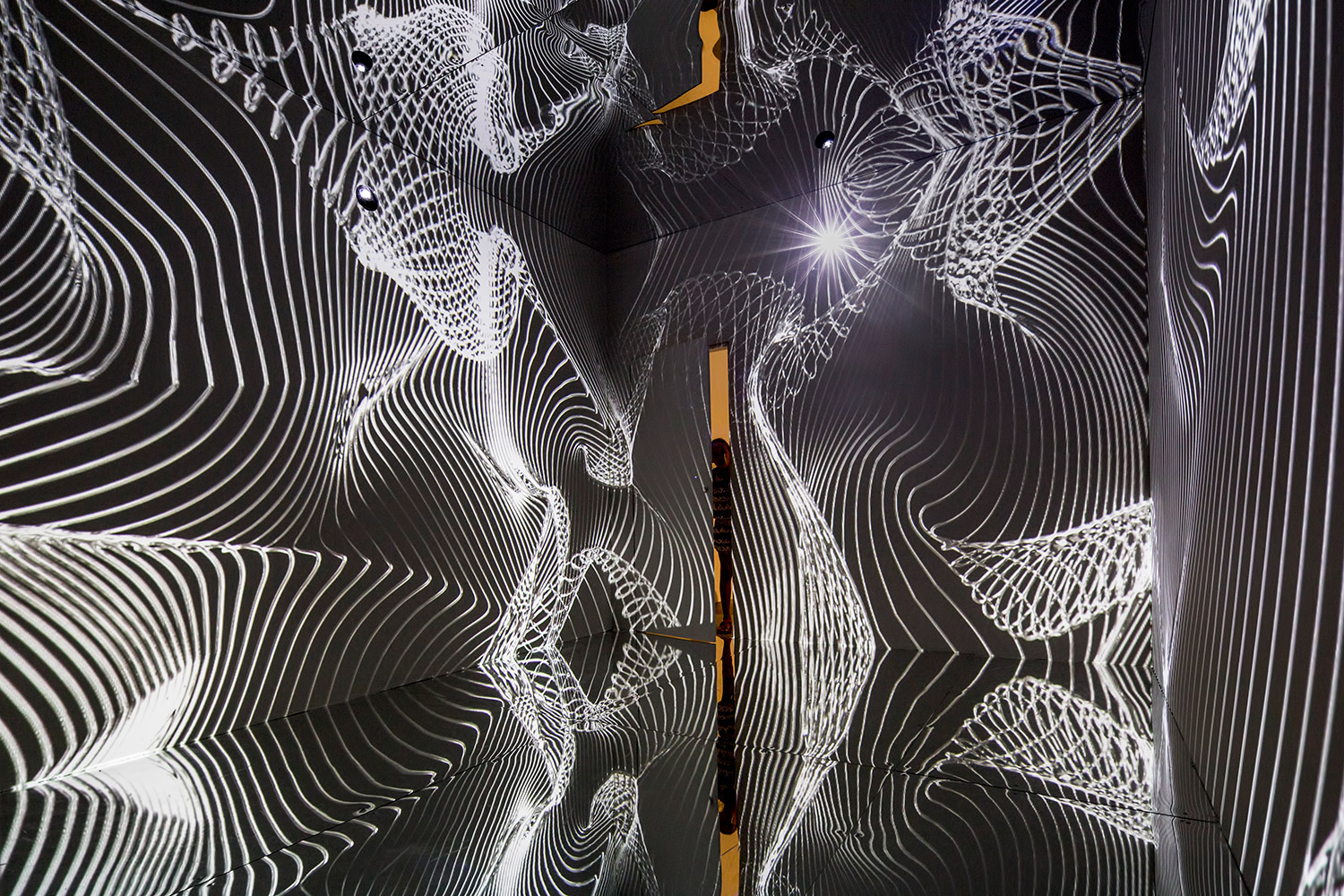Refik Anadol
Refik Anadol, whose A/V Performances, of which we cannot forget, is the first item on our itinerary with his “Infinity Room” project on view for the Istanbul Biennial. We talked about the thought-provoking process behind the works of Refik who pushes the limits of technology in his very new project and leads the way for a new movement.
You’ve become the one and only name that comes to mind in Turkey with your works, as well as becoming an influential name internationally. Could you tell us how you got to this point; from Istanbul to Los Angeles?
Thank you. The shift from Istanbul to Los Angeles has certainly made a change in my life. What’s more important, I’ve always had the desire to reveal many ideas and dreams since I graduated. We were able to realize many innovative and experience focused projects with our design studio titled Antilop in Istanbul. Yet, I decided to do a master’s degree to fulfill my individual desire of closely witnessing a broader research and development culture. UCLA was quite distinguished as a university compared to many of its similars in the world. I had the opportunity to attend other leading colleges such as MIT and NYU. However, my personal interest in public space art, especially exploring the origins of the Light + Space movement and my wish to closely study our weird acquaintanceship period in the age of technology as human beings have played a part in my reaching this point.
“We’re so lucky that technology provided us with the chance to concretise many of the ideas we could only dream about before.”
Your “Infinity Room” project, within the scope of Istanbul Biennial’s parallel events, is a part of your “Temporary Immersive Environment Experiments” project which is a kind of research on visual and audio installations. Could you please tell us about this work, the methods behind it and the process so far?
It was a project I always had in my mind during my graduate years, two years ago. As an artist, I’ve always been close to the concept of artificial reality as it is integrated into almost every inch of my work. The reality we live within has been capsized in the last century by the most genius questions and projects. It became one of my biggest obsessions that architecture, despite being in touch with every moment of our lives, couldn’t adapt itself to such an inevitable change yet. This project came about during such a period. I built the first prototype at my studio in Los Angeles. It took its final shape as a result of my interest in the idea that is not found in artificial reality goggles such as Oculus, capable of cohabitation and sharing, and what’s more important, making the audience apart of the work.
Is it possible to say that the starting point of the fictionalised installations based on voice, architecture and mathematics is to question the perception of environment?
Absolutely. Many artists have created genius works and discourses on this concept in the last half-century. We’re so lucky that technology provided us with the chance to concertise many of the ideas we could only dream about before. Limits have decreased; the idea of artists developing specific software for certain projects has evolved. The audience has always been ready.
Your “Infinity Room” project, within the scope of Istanbul Biennial’s parallel events, is a part of your “Temporary Immersive Environment Experiments” project which is a kind of research on visual and audio installations. Could you please tell us about this work, the methods behind it and the process so far?
It was a project I always had in my mind during my graduate years, two years ago. As an artist, I’ve always been close to the concept of artificial reality as it is integrated into almost every inch of my work. The reality we live within has been capsized in the last century by the most genius questions and projects. It became one of my biggest obsessions that architecture, despite being in touch with every moment of our lives, couldn’t adapt itself to such an inevitable change yet. This project came about during such a period. I built the first prototype at my studio in Los Angeles. It took its final shape as a result of my interest in the idea that is not found in artificial reality goggles such as Oculus, capable of cohabitation and sharing, and what’s more important, making the audience apart of the work.
“I have never had political or socio-cultural obsessions.”
Could you tell us a little bit about the process behind A/V Performances, from the starting point to the application phase? How does it start, what nourishes it, how does it come to a conclusion?
There are many different starting points. I have to say that there wasn’t such an intense imitation process as there is now in the years I first started. For each building and spectator, there were many works created with respect to more conceptual frameworks. I’ve always cared about creating works that can be understood, be known, aware of the communication between the building and architecture, as well as its function. Recently we’ve seen too many projects destroying ethical values because of the competition about branding and increasing customer satisfaction among creative agencies. I believe that a successful performance requires the core intention of design and self-criticism of art.
Can you tell us about your dissertation project Walt Disney Concert Hall, which won the Best Vision Award of Microsoft Research?
As I’ve already told you, it was a project for which I wanted to devote myself to a broad research and development process. Within this scope, I imagined a unique project with Frank Gehry design Walt Disney Concert Hall and LA Phil. We were lucky to have the necessary financial and emotional support for this project from Microsoft Research, the most developed research institute in the world. As you already know, the rest of the story progressed in a very positive way. I saw that the energy fueled by being understood, innovation and appreciation can beat all the impossibilities and hitches on our way. I also understood the importance of collaborating with LA Phil, the most extensive philharmonic orchestra and performance institution in the world.
Is it possible to consider this project a turning point in your career?
Absolutely yes. Being able to exist in the street/public space in performance arts is quite meaningful and pleasant. However, it was being able to work on the stage at Walt Disney Concert Hall with LA Phil and architect Frank Gehry that brought the situation to the turning point. The fact that many other institutions launched similar projects at once is an indicator of the project’s success. I guess the possibility of turning a brand new idea into a new movement makes this project a turning point in my life.
Is there a message you adopt and try to highlight in every project of yours?
Innovation, self-criticism of art and design, aesthetical concerns. I have never had political or socio-cultural obsessions. I try to free my mind from those bottomless pits as much as possible so that the discourses on future can be simple and grow differently. There are already hundreds of great artists who can criticise and showcase the current state of affairs in the world.
Your work is inclusive of certain periods and instant experiences for your followers. How do you consider creating more permanent works, offering a chance of being followed via videos and photography?
Currently I’ve been engaged in artistic projects in a lot of permanent public spaces. It was an absolute part of my dream. Public space is the most powerful artistic discourse to create a really permanent and strong discourse on the world and the humanity. Because it’s simple, free and it’s definitely where we live.
What are your upcoming projects we’ll hear about in the near future?
I got the chance to make the biggest and most technically developed media architectural application of the West Side of America at San Francisco next month. It’s been the first permanent art project I closely developed with SOM Architecture Office in the last year. I can’t wait for its opening! Last but not least, there are a new series of surprise projects to be launched this year together with many names such as LA Phil and New York Philharmonic Orchestra.

